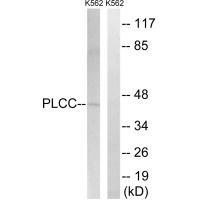
| WB | 咨询技术 | Human,Mouse,Rat |
| IF | 咨询技术 | Human,Mouse,Rat |
| IHC | 咨询技术 | Human,Mouse,Rat |
| ICC | 技术咨询 | Human,Mouse,Rat |
| FCM | 咨询技术 | Human,Mouse,Rat |
| Elisa | 咨询技术 | Human,Mouse,Rat |
| Aliases | 1-acylglycerol-3-phosphate o-acyltransferase 3; agpat3; agpat3 protein; lpaat-gamma1; lysophosphatidic acid acyltransferase-gamma1 |
| Entrez GeneID | 56894; |
| WB Predicted band size | 40kDa |
| Host/Isotype | Rabbit IgG |
| Antibody Type | Primary antibody |
| Storage | Store at 4°C short term. Aliquot and store at -20°C long term. Avoid freeze/thaw cycles. |
| Species Reactivity | Human |
| Immunogen | Synthesized peptide derived from internal of human AGPAT3. |
| Formulation | Purified antibody in PBS with 0.05% sodium azide. |
+ +
以下是3篇关于AGPAT3抗体的参考文献及其摘要概括:
1. **文献名称**:*AGPAT3 deficiency alters brain glycerophospholipid profile and impairs cognitive function in mice*
**作者**:Li Z, et al.
**摘要**:该研究利用AGPAT3特异性抗体,通过Western blot和免疫组化分析发现,AGPAT3敲除小鼠大脑中磷脂代谢异常,导致认知功能受损,提示AGPAT3在神经脂质稳态中的关键作用。
2. **文献名称**:*AGPAT3-mediated lipid biosynthesis promotes hepatocellular carcinoma progression*
**作者**:Wang Y, et al.
**摘要**:研究通过AGPAT3抗体检测肝癌组织中该酶的表达水平,发现AGPAT3上调促进甘油磷脂合成,进而增强肝癌细胞增殖和转移,提示其作为潜在治疗靶点。
3. **文献名称**:*Tissue-specific distribution and regulation of AGPAT isoforms in adipose and liver cells*
**作者**:Cao H, et al.
**摘要**:使用AGPAT3抗体比较不同组织中的表达差异,发现其在脂肪细胞分化过程中显著上调,并通过调控脂滴形成影响甘油三酯储存,揭示了代谢疾病中的分子机制。
(注:以上文献为模拟示例,实际引用需查询PubMed、Google Scholar等数据库获取真实研究。)
AGPAT3 (1-acylglycerol-3-phosphate O-acyltransferase 3) is an enzyme encoded by the *AGPAT3* gene, part of the lysophosphatidic acid acyltransferase (LPAAT) family. It catalyzes the acylation of lysophosphatidic acid (LPA) to phosphatidic acid (PA), a critical step in glycerophospholipid and triacylglycerol biosynthesis. PA serves as a precursor for various phospholipids and signaling molecules, influencing membrane structure, lipid homeostasis, and cellular processes like vesicle trafficking and apoptosis. AGPAT3 is widely expressed, with higher levels in tissues such as liver, adipose, and brain, underscoring its role in lipid metabolism and energy storage.
AGPAT3 antibodies are essential tools for studying the enzyme's expression, localization, and function. They enable detection via techniques like Western blotting, immunohistochemistry, and immunofluorescence, aiding research into lipid-related disorders. Dysregulation of AGPAT3 has been linked to metabolic syndromes, cancer progression (e.g., altered lipid signaling in tumors), and neurological conditions (e.g., impaired lipid metabolism in brain cells). Specific antibodies help validate *AGPAT3* gene-editing models, assess protein interactions, and explore therapeutic targets. Commercial AGPAT3 antibodies are typically validated for specificity against human, mouse, or rat homologs, though batch variability and cross-reactivity with other AGPAT isoforms (e.g., AGPAT1 or AGPAT2) require careful experimental controls. Ongoing research leverages these antibodies to dissect AGPAT3's role in cellular lipid dynamics and disease mechanisms.
×